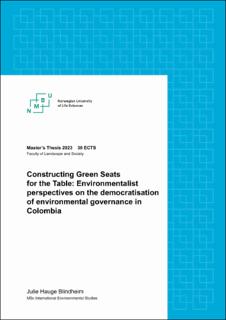| dc.description.abstract | This dissertation presents an assessment of the strengths and limitations of environmental democracy in the context of governance through exploring the localisation of the Escazú Agreement and its ongoing implementation in Colombia. The country has observed a procedural strengthening of environmental governance measures, yet the situation has remained volatile and dangerous for those involved in environmental matters. As environmental democracy aims to enhance public participation in decision-making regarding environmental matters, it is of high value to identify the strengths and weaknesses of such an approach to environmental governance within the socio-ecological conditions of a country such as Colombia. Particularly in terms of having substantive participation, the exploration of how the agreement is understood and experienced by those affected by it is essential. With the dissertation seeking to assess the localisation of the Escazú Agreement, and in turn, understand the theoretical and practical implications of integrating environmental democracy into Colombian environmental governance, it creates fertile ground for understanding the significance of regional legal frameworks in promoting environmental, and potentially also ecological, justice. The research was based on 14 semi-structured interviews with local environmentalists in Medellín and Bogotá, conducted over a six-week period in early 2023. In understanding the Escazú Agreement as a tool for democratisation, the dissertation argues that the agreement can positively impact environmental justice in Colombia. The study reveals that the agreement will not have a direct impact on nature as an actor in its own right as the agreement takes an anthropocentric approach to environmental governance. This also points to a need for radical structural change, and here, environmental justice can serve as a steppingstone for more transformative measures enabling ecological justice in the future. | |
